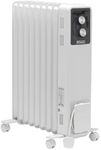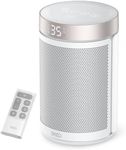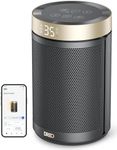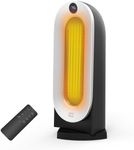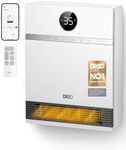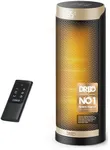Buying Guide for the Best Room Heaters
Choosing the right room heater involves understanding your specific heating needs, the size of the space you want to heat, and the type of heater that will best suit your environment. Room heaters come in various types, each with its own set of features and benefits. It's important to consider factors such as energy efficiency, safety features, and the heater's ability to maintain a comfortable temperature. By understanding the key specifications, you can make an informed decision that ensures warmth and comfort in your space.Type of HeaterRoom heaters come in different types, including convection, radiant, and fan-forced heaters. Convection heaters are ideal for heating entire rooms as they circulate warm air throughout the space. Radiant heaters are best for spot heating, providing direct warmth to people or objects in their path. Fan-forced heaters use a fan to distribute heat quickly and are suitable for smaller spaces. Consider the size of the room and how quickly you need it to warm up when choosing the type of heater.
Heating CapacityHeating capacity is measured in watts or BTUs and indicates how much heat a heater can produce. A higher wattage or BTU rating means more heat output. For small rooms, a heater with a lower capacity (around 750-1500 watts) may suffice, while larger rooms may require a heater with a higher capacity (2000 watts or more). Assess the size of the room and the level of warmth you desire to determine the appropriate heating capacity.
Energy EfficiencyEnergy efficiency refers to how effectively a heater converts energy into heat. Look for heaters with energy-saving features such as adjustable thermostats, energy-saving modes, or timers. These features help reduce energy consumption and lower utility bills. If you plan to use the heater frequently, an energy-efficient model can provide long-term savings and is better for the environment.
Safety FeaturesSafety features are crucial in room heaters to prevent accidents and ensure safe operation. Look for heaters with features like tip-over protection, overheat protection, and cool-touch exteriors. Tip-over protection automatically shuts off the heater if it is knocked over, while overheat protection turns off the heater if it gets too hot. These features are especially important if you have children or pets in the home.
Noise LevelNoise level is an important consideration, especially if you plan to use the heater in a bedroom or office. Some heaters, particularly fan-forced models, can be noisy. If noise is a concern, look for heaters that are specifically designed to operate quietly. Radiant heaters tend to be quieter than fan-forced heaters, making them a good choice for noise-sensitive environments.
PortabilityPortability refers to how easy it is to move the heater from one room to another. Portable heaters are typically lightweight and may have handles or wheels for easy transport. If you need to heat different areas of your home at different times, a portable heater can be a convenient option. Consider the weight and design of the heater to ensure it meets your mobility needs.



